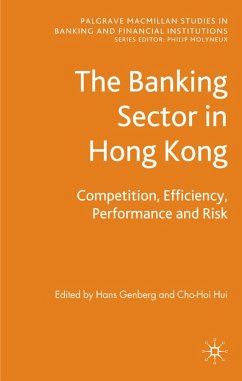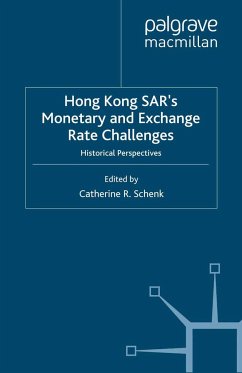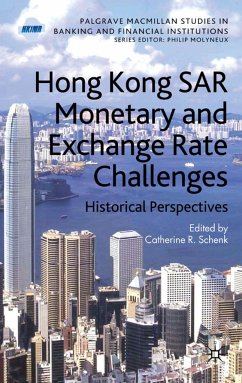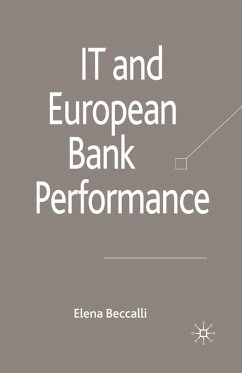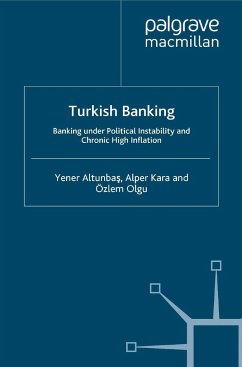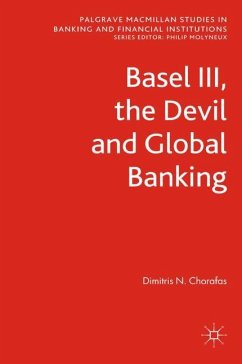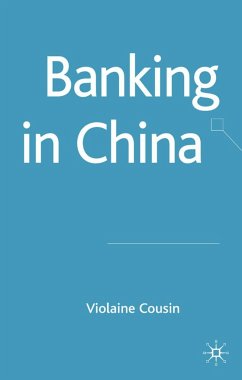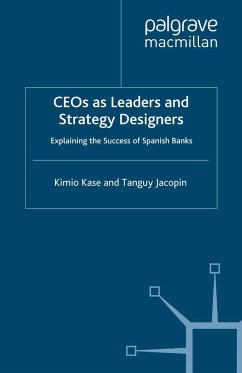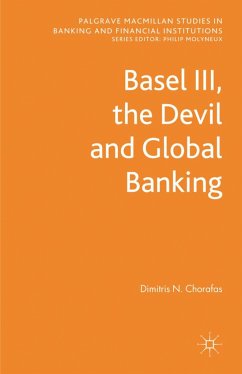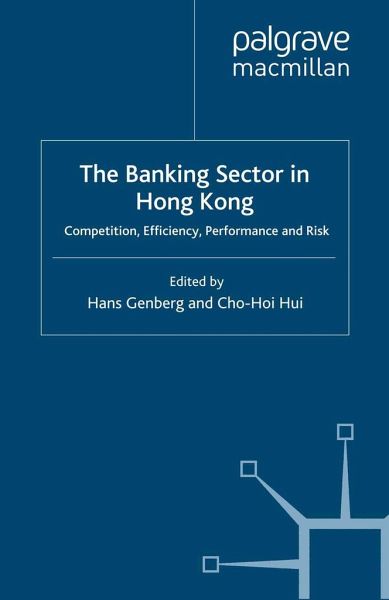
Broschiertes Buch
The Banking Sector in Hong Kong
Competition, Efficiency, Performance and Risk
Herausgegeben: Genberg, H.; Hui, C.
Versandkostenfrei!
Versandfertig in 6-10 Tagen
Weitere Ausgaben:

PAYBACK Punkte
38 °P sammeln!





The book extensively discusses the structure and stability of the Hong Kong banking sector, using economic theory and advanced empirical econometric techniques. It is important for readers who are interested in studying the banking industry in general, and the Hong Kong banking sector in particular.
HANS GENBERG is Executive Director, Research Department at the Hong Kong Monetary Authority (HKMA). He is also Director of the Hong Kong Institute for Monetary Research (HKIMR). He obtained his PhD degree in Economics from the University of Chicago. He had been working as a Professor in Economics at the Graduate Institute of International Studies since 1979. Prior to joining the HKMA and HKIMR in February 2005, he was the Head of the Economics Section of the Institute. He has also been a visiting scholar at the International Monetary Fund and the World Bank. He has published widely on issues related to monetary and exchange rate policy in a number of journals, including the Journal of Monetary Economics and the Journal of International Economics. He has a keen research interest in monetary and financial developments in East Asia CHO-HOI HUI is Head, Market Research Division of the Research Department, HKMA. He was previously a senior manager in the Banking Policy Department. Prior to joining the HKMA in 1997, he was a derivative analyst at Citibank. His research papers have appeared in a number of journals, including the Journal of Risk, Finance and Stochastics, the Journal of Fixed Income, and Quantitative Finance. He holds a BS in physics from the University of Wisconsin at Madison and a PhD in applied physics from Cornell University.
Produktdetails
- Palgrave Macmillan Studies in Banking and Financial Institutions
- Verlag: Macmillan Education / Palgrave Macmillan UK / Springer Palgrave Macmillan
- Artikelnr. des Verlages: 978-1-349-30073-0
- 1st ed. 2008
- Seitenzahl: 280
- Erscheinungstermin: 1. Januar 2008
- Englisch
- Abmessung: 216mm x 140mm x 18mm
- Gewicht: 390g
- ISBN-13: 9781349300730
- ISBN-10: 134930073X
- Artikelnr.: 45081855
Herstellerkennzeichnung
Libri GmbH
Europaallee 1
36244 Bad Hersfeld
gpsr@libri.de
Hans Genberg and Cho-Hoi Hui have brought together a detailed assessment of conditions in the Hong Kong banking sector in the years following deregulation in 2001. The analysis of competition and efficiency, interest rate setting and default risk, and stress-testing procedures adopted by banks following roll out of Basel II, by the research staff of the Hong Kong Monetary Authority, offers a careful examination of these issues. It is essential reading for economists, bankers, regulators and policymakers working in Hong Kong and the Asian region - Paul Mizen, Professor of Monetary Economics& Director, Centre for Finance and Credit Markets
This is a collection of outstanding research work of the Hong Kong Monetary Authority on issues
This is a collection of outstanding research work of the Hong Kong Monetary Authority on issues
Mehr anzeigen
of high relevance in understanding the structure and stability of the Hong Kong banking sector. Through the insightful analyses, readers will be better able to appreciate the strength of Hong Kong in meeting opportunities and challenges ahead in furthering its position as a leading financial centre - He Guangbei, Chairman, Hong Kong Association of Banks
This book demonstrates the importance of high-quality research in contemporary central banking. It contains an impressive collection of authoritative articles by the research staff of the Hong Kong Monetary Authority. Their contributions exploit a range of sophisticated techniques to investigate such key issues as the crucial mortgage market, the dominance of large banks, the impact of market liberalisation and the stability of the financial system. The book's findings are set firmly in the context of worldwide market developments and banking behaviour, which gives the volume considerable international relevance. The story of how Hong Kong has pursued competition and improved efficiency without sacrificing stability sheds new light on the city's remarkable role as a major Asian financial centre - Leo F. Goodstadt, former Head of the Hong Kong Government's Central Policy Unit, author of Profits, Politics and Panics: Hong Kong's Banks and the Making of a Miracle Economy, 1935-1985
This book demonstrates the importance of high-quality research in contemporary central banking. It contains an impressive collection of authoritative articles by the research staff of the Hong Kong Monetary Authority. Their contributions exploit a range of sophisticated techniques to investigate such key issues as the crucial mortgage market, the dominance of large banks, the impact of market liberalisation and the stability of the financial system. The book's findings are set firmly in the context of worldwide market developments and banking behaviour, which gives the volume considerable international relevance. The story of how Hong Kong has pursued competition and improved efficiency without sacrificing stability sheds new light on the city's remarkable role as a major Asian financial centre - Leo F. Goodstadt, former Head of the Hong Kong Government's Central Policy Unit, author of Profits, Politics and Panics: Hong Kong's Banks and the Making of a Miracle Economy, 1935-1985
Schließen
Für dieses Produkt wurde noch keine Bewertung abgegeben. Wir würden uns sehr freuen, wenn du die erste Bewertung schreibst!
Eine Bewertung schreiben
Eine Bewertung schreiben
Andere Kunden interessierten sich für




